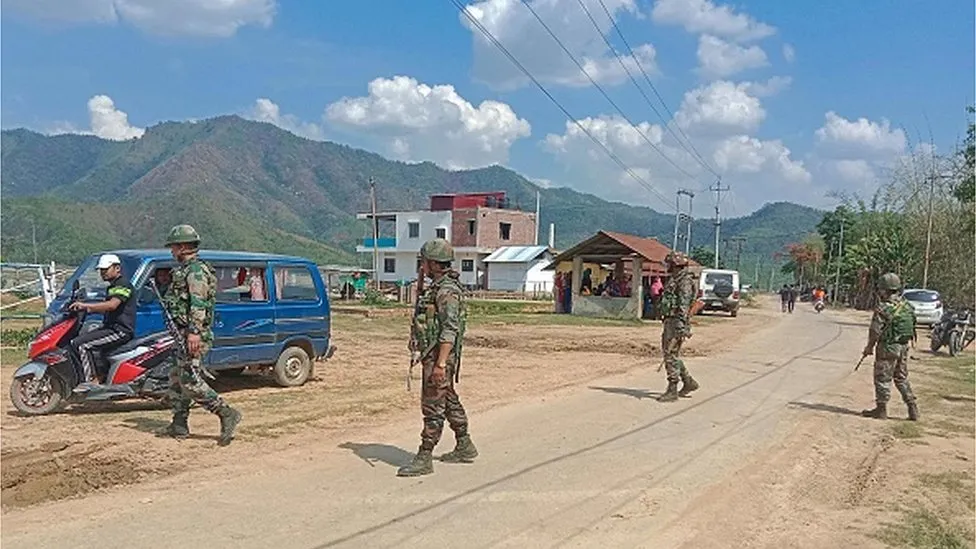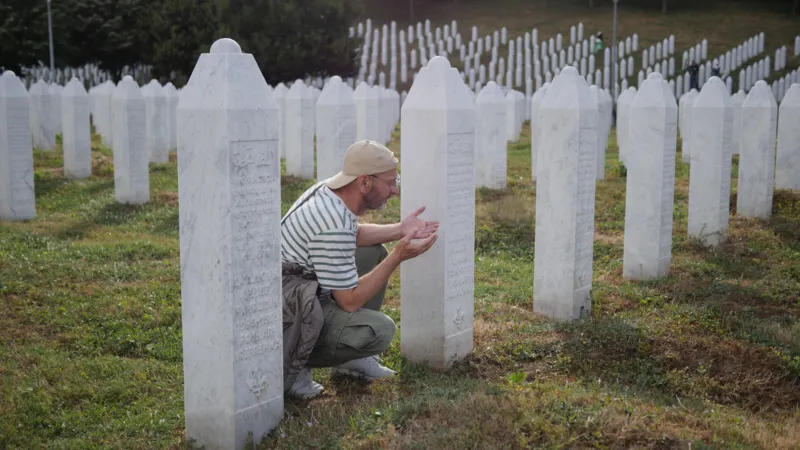Manipur: The abandoned villages in the crosshairs of India violence
Ethnic violence has plunged Manipur, India's scenic state bordering Myanmar, into turmoil. Persistent clashes between the Meiteis and Kukis for over two months have left both feeling besieged. The neighbouring villages of these communities appear to be particularly susceptible to attacks. In the second of a two-part series on Manipur, the BBC's Soutik Biswas visited a scenic valley where Meitei villages have come under attack.

Under the cover of darkness in early May, the men emerged from the hills above.
They were shouting slogans that pierced the stillness of the night and firing gunshots that punctuated the balmy air. Some of them wielded swords, while others brandished bottles of petrol and diesel.
Murders and mayhem tearing apart an Indian state
"Kill them, burn them!" echoed a war cry that reverberated in the air, and remained etched in Khunaijam Shanti's memory.
She and fellow villagers had been dreading an attack as news - and rumours - of ethnic violence spread like wildfire through whispers and mobile phones. Around midnight they abandoned their homes, evading the fury of the mob.
On 3 May, ethnic violence sparked by a thorny affirmative action row erupted in India's north-eastern state of Manipur. More than 130 people have died since, during clashes between the majority Meitei and the tribal Kuki minority groups. Some 60,000 have become refugees in their own land.
The Meitei - mostly practising Hindus - like Ms Shanti live in community villages in the sprawling valley, including the capital, Imphal. The Kukis, mostly Christians, reside in their chief-run villages in the rolling hills.
The ongoing violence has tragically led to a near-complete segregation of the two groups. Dolaithabi, where Ms Shanti lived, was among the four villages - Ekoi, Yangkhaman and Leitanpokpi were the three others - in the Imphal East district that was attacked by Kukis in a fierce night of burning and looting.
These Meitei-dominated villages - where nearly 3,000 people lived - were particularly vulnerable, nestled against the foothills in close proximity to Kuki settlements. Villages of the two groups are barely separated, with only 1,500 (1.5km) metres between them. Here - and in many other similar areas - security forces have set up buffer zones to restore peace. On both sides, civilians - calling themselves "village defence forces" - have also built bunkers, often manned by armed volunteers.
It is difficult to imagine a place so scenic and tranquil to be at the crosshairs of a violent conflict. A dammed river called Iril flows past sleepy villages of sloped corrugated tin homes. Hand-tended rice farms cover the floodplains, fringed by slopes that rise to the cloud-clapped emerald green hills of oak and pine.
"This is a valley surrounded by hills. It is a vulnerable area. They [the Kukis] have the vantage point. They can take pot shots from the hills. Anything can happen anytime," said Lenin Lamabam, a senior officer of Manipur's military police. He, along with 80 of his men and hundreds of border forces, is patrolling the area.
After the violence in May - and a few isolated attacks later - more than half of the people living here fled and took shelter with their relatives or in relief camps. Their homes and granaries had been gutted, and all their belongings - including TVs and washing machines - had been looted. A magical landscape is now marked by the remains of burnt-out homes and vehicles.
A few men have returned to resume tending to their farms and livestock during daylight hours. Livelihoods have suddenly become perilous: farmers of both communities have been shot at while toiling in the fields. "I still don't understand how things turned so grave, and so quickly," said Chanam Tapha, a 60-year-old widow, who is now living in a relief camp. (Half of the tens of thousands displaced in the violence are Meiteis who are living in relief camps in the valley, an official said.)
In Leitangpokpi - now a half-deserted village of some 100 homes, two pharmacies, a bazaar and a primary school - an unlikely exhortation surfaced in the ruins of the damaged homes. A paper pasted on a corrugated tin wall declared local support for a "war on drugs". A local "committee for the war on drugs" urged people to stop poppy plantation and "save our generation".
The underlying tensions in Manipur stem from a complex interplay of various factors, one of which is a crackdown on drugs in recent years. The Bharatiya Janata Party (BJP)-led state government, under Chief Minister N Biren Singh, who is a Meitei, launched a controversial campaign targeting poppy farming. Since 2017, his government claims to have destroyed more than 18,600 acres of poppy farms, the majority of them in Kuki-inhabited areas. (Manipur has long battled a drug-addiction crisis and is among four north-eastern Indian states bordering Myanmar, the world's second-largest opium producer.)
But Mr Singh's campaign also became a flashpoint between the two groups. He cautioned that villages growing poppy - mostly Kuki homelands - would be stripped of their welfare benefits, and accused Kukis of doing "drugs business". Kukis accused Mr Singh of "selective targeting and vilification" of the community - an allegation he denies.
In Leitangpokpi, villagers talk about farms in the hills above being cleared to grow poppy. Most Meitei men here were farmers or firewood traders. They would take Kuki-owned land in the hills on three-year leases, chop down trees and sell firewood in the market, said Tarun Ngangom, a local former teacher. "But this has slowed down in recent years, because we hear many of the villages have begun growing poppy," he said, a claim that could not be independently verified.
The scale of poppy farming in these parts is unclear. According to official figures, more than 730 acres of poppy farms in Imphal East district - home to 16% of Manipur's estimated 3.3 million people, and including Naga, Meitei and Nepali inhabited villages - have been destroyed since 2017.
Then there's the brewing fault line over undocumented illegal immigrants from Myanmar, a country with which Manipur shares a near-400km (248-mile) border. Stickers bearing the message "go back, Burmese refugees" have begun appearing on storefronts and residences across Meitei villages.
Mr Singh has repeatedly spoken of concerns about the civil war in Mynamar prompting an influx of refugees, who are ethnically close to the Kukis. (The majority of these refugees - more than 40,000 - have entered and taken refuge in neighbouring Mizoram.) A state government panel identified 2,187 immigrants from Myanmar in four districts of Manipur until end-April. An official note spoke of a "large number of illegal migrants" and said the "recent violence was fuelled by influential illegal poppy cultivators and drug lords from Myanmar settling in Manipur".
But life among the ordinary people appeared to have been largely without friction before the recent violence. In villages nestled against the foothills, Meiteis have travelled uphill to gather firewood and employ excavators for road construction. And Kukis have come down to do business.
"We have been living peacefully with our Kuki neighbours for years," said Ms Shanti. "We would go to their villages, they would come to ours and do their shopping. Some of us have even jointly invested in [local] small savings funds.
"How did our friends and neighbours become enemies overnight? Were they instigated by outsiders?" she asks.
-bbc







